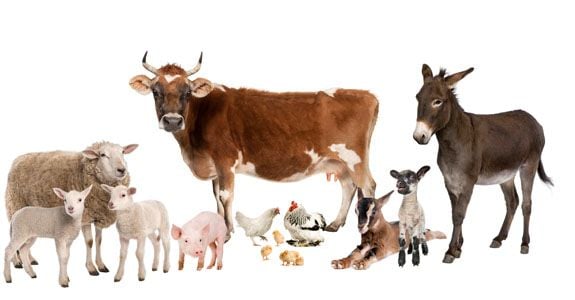Identifying the signs of sickness in a dog can be challenging, even for the most vigilant pet owners. Since a sick dog is unable to verbally communicate what hurts, pet owners must pay close attention to identify the signs of illness. Subtle changes in behavior or appetite may be symptomatic of an underlying
Read more

Have you ever dreamed of one day owning a farm? Well, owning some livestock can give you the same rewarding feeling. Livestock consists of animals such as cows, pigs, sheep, goats, donkeys, horses, and mules. Whether you want an animal to provide you with fresh eggs in the morning or one to ride through your pasture, livestock animals are your best bet to give you what you are looking for.
Choosing what livestock to raise relies heavily on how much space you have, if they need fencing, how much they eat, state and local property laws, and more. You should also consider what type of veterinary care your livestock will require to avoid the spread of diseases and external parasites. Your veterinarian can recommend the best vaccinations for your livestock so they stay as healthy as possible. Continue to the articles below to learn how you should care for each livestock animal.
-
Is My Dog Sick?
Category: Newsletter Library, Recognizing Illness
-
Helping Dogs with Low Vision or Blindness
Category: Newsletter Library, Recognizing Illness
As veterinary medicine advances, dogs are living longer and longer. With advancing age, more geriatric diseases are becoming prevalent. Problems with vision, such as cataracts, glaucoma, and keratitis, are common. Many of these problems occur so gradually that some people don't know they have a blind
Read more -
H1N1 or Swine Flu Virus
Category: Newsletter Library, Recognizing Illness
The H1N1 or swine flu epidemic has many people concerned. It certainly holds the potential for severe, worldwide disease in humans. Currently, most cases in the U.S. have not been as serious as in other countries. Flu viruses commonly mutate though, and even a small mutation could increase the pathogenicity
Read more -
Glaucoma in Pets: What You Need to Know
Category: Newsletter Library, Recognizing Illness
Glaucoma is typically a disease affecting middle- age to older pets. The symptoms can be very insidious in that they may not be noticeable at first, but eventually you may see a red eye or a dilated pupil, and ultimately, as the disease progresses, you can see that the eyeball is larger than normal. Glaucoma
Read more -
Don't Sneeze at Pet's Cold or Flu-Like Symptoms - Get to Your Vet
Category: Newsletter Library, Recognizing Illness
On February 14, 2011 IDEXX Research Laboratories confirmed that the 2009 H1N1 influenza virus was present in two cats from the same Wisconsin home. The cats were treated at an emergency veterinary hospital for severe respiratory distress. The owner of the cats had been experiencing flu-like symptoms. The
Read more -
Evaluation and Diagnosis of a Red Eye in Dogs
Category: Newsletter Library, Recognizing Illness
Dogs occasionally develop a red eye. The redness may be in the white of the eye, in the clear part of the eye called the cornea, or within the eyeball. There are many causes of a red eye, but all ocular diseases should always be considered an urgent matter, and be checked immediately by a veterinarian. Evaluation A
Read more -
Ear Problems for Pets
Category: Newsletter Library, Recognizing Illness
Symptoms of ear disease are shaking the head, scratching at the ears, discharge from the ear canal, odor from the ear, or redness of the ear flap or entrance to the ear canal. Your pet may be tilting their head to one side although it's important to point out that there are causes for this other than
Read more -
Dog Allergies and Lesion Locations
Category: Newsletter Library, Recognizing Illness
Dogs are taken to the veterinarian for skin problems more than any other reason. Most often they are itchy and that itchiness is typically due to allergies. The text of canine and feline dermatological diseases is large because there are hundreds of skin diseases, however, it can help to start with some
Read more -
Canine Lyme Disease
Category: Newsletter Library, Recognizing Illness
There are several options for protecting dogs against canine Lyme disease. One option is vaccination, which may be the best choice for pets who live in an endemic area. Annual vaccination is an affordable means of protecting pets against this disease, which can have serious health implications. Some
Read more -
Canine Juvenile Orthopedic Diseases
Category: Newsletter Library, Recognizing Illness
Puppies are happy and full of energy, running, wrestling, and playing so much that we often wish we had that much energy! But when that puppy is not happy, when it is lethargic and limping, then a visit to the veterinarian is in order. There are several orthopedic diseases that affect young dogs. Osteochondrosis
Read more -
Canine Hip Dysplasia: Causes & Treatment
Category: Newsletter Library, Recognizing Illness
Canine hip dysplasia is the abnormal formation of the hip joint and one of the leading causes of rear leg lameness in dogs. Hip dysplasia is most prevalent in larger breed dogs, especially German Shepherds, Golden Retrievers, Labradors, Saint Bernards and Rottweilers. On the other hand, hip dysplasia
Read more -
Cancer in Pocket Pets
Category: Newsletter Library, Recognizing Illness
A tumor (also known as neoplasm) is an abnormal growth of cells; this growth may be either benign or malignant. Benign tumors do not spread throughout the body and often have a limited impact on a pet’s overall health. Malignant tumors can develop in one location, such as a hormone-producing gland,
Read more -
Addison's Disease in Dogs
Category: Newsletter Library, Recognizing Illness
Addison's disease is an endocrine disorder where the adrenal glands, near the kidneys, fail to produce enough hormones. This disease is relatively uncommon (approximately one case per 3000 dogs) but it is more common in dogs than humans. It is very rare in cats. The common symptoms of Addison's are
Read more -
Acute Kidney Injury in Dogs
Category: Newsletter Library, Recognizing Illness
Leptospirosis is a bacterial, worldwide disease that can also affect humans. Dogs are usually exposed by contact with the urine of affected animals, often wildlife, or by drinking contaminated water. There is a vaccine that can protect dogs from four strains of Lepto. Antifreeze toxicity is another
Read more -
Acupuncture as Pain Management for Pets
Category: Newsletter Library, Recognizing Illness
If your pet is suffering from pain or another illness but not responding to traditional veterinary care, veterinary acupuncture may be an effective treatment option. Veterinary acupuncture is very similar to the type of acupuncture used to treat humans. Long, thin needles are inserted at specific pressure
Read more -
How to Prevent Motion Sickness in Pets
Category: Newsletter Library, Keeping Pets Healthy
Location
Find us on the map
Burlingame Veterinary Clinic
8511 SW Terwilliger Blvd.
Portland, OR, United States

